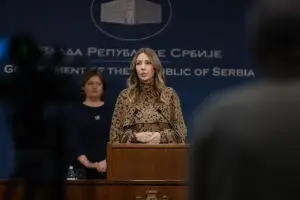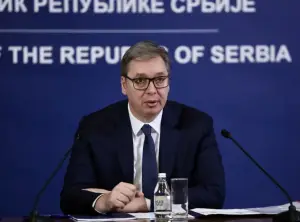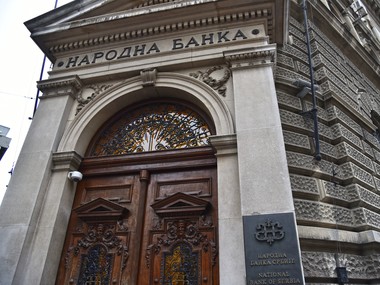- Serbia
Get to know Serbia
- Citizens
Culture and science
Health services
Pension and disability insurance
- Business
Employment
Economy
- Media
- Government
- Contact
Keep in touch
Contact form
Back
Keepin touch
Whether you have a question, comment, suggestion or any problem in the purview of the government, send us your message and we will try to respond as soon as possible. If your problem is not in our purview, we will forward your message to the relevant institution.
Q:
A:
Serbia significantly improves its economic capacity
Belgrade,
21 December 2017
The National Bank of Serbia (NBS) announced that the Board of Executive Directors of the International Monetary Fund (IMF) decided at yesterday's session to successfully complete the eighth review of the current standby precautionary arrangement with the Republic of Serbia.
The statement says that during the arrangement, which expires on 22 February 2018, the Republic of Serbia did not use the funds that were available to it.
At the meeting of the IMF Executive Board, it was estimated that during the arrangement, Serbia made significant progress by implementing the agreed economic programme.
The market confidence has increased, investment growth has been achieved, as well as the growth of economic activity.
The International Monetary Fund welcomed the improvement of the labour market conditions, the movement of inflation towards the central target value, the rapid reduction of public debt and the strong external position of the country.
Also, there has been visible progress in the area of structural reforms, but the IMF pointed out that in this area it is necessary to make deeper institutional reforms in order to ensure sustainable economic growth.
Regarding the fiscal policy, the level of public debt is on the downward path due to a significant fiscal adjustment and that with the 2018 Budget Law a space has been created for capital investments, and that tax incentives will further stimulate employment growth.
The International Monetary Fund points out that the continuation of reforms will improve public administration and contribute to more efficient provision of public services.
The International Monetary Fund has estimated that monetary policy has managed to keep inflation under tight control, thus supporting the economic recovery of the country.
Describing the monetary policy framework as appropriate, and bearing in mind the uncertainties on the domestic and foreign markets, the International Monetary Fund welcomed the recent flexibility of the foreign exchange rate of the domestic currency, which acted towards the appreciation of the dinar due to improved macroeconomic fundamentals and market conditions.
The reforms in the financial sector strengthened the banking sector, which is now in a much better position to support economic activity.
The International Monetary Fund praised the very good results of implementing the strategy for troubleshooting problem loans, but also pointed out that further activities in this respect are necessary.
Significant progress in the implementation of structural reforms has strengthened the growth potential of the Serbian economy and influenced the reduction of fiscal risks and a better job creation.
The International Monetary Fund points out that there is still much left to do when it comes to the remaining state-owned enterprises, in order to improve their management, investments and to boost administrative capacity.
It was pointed out that the business environment in Serbia was improved in conditions of macroeconomic stability and a better regulatory framework.
Also, the continuation of tax reforms and the elimination of uncertainty in the judiciary system is suggested, which would further stimulate business activity.
The Board of Executive Directors of the International Monetary Fund concluded that the Republic of Serbia, by closing the arrangement, succeeded in achieving macroeconomic adjustment by implementing the agreed economic programme and significantly strengthening its economic capacity, the statement said.
At the meeting of the IMF Executive Board, it was estimated that during the arrangement, Serbia made significant progress by implementing the agreed economic programme.
The market confidence has increased, investment growth has been achieved, as well as the growth of economic activity.
The International Monetary Fund welcomed the improvement of the labour market conditions, the movement of inflation towards the central target value, the rapid reduction of public debt and the strong external position of the country.
Also, there has been visible progress in the area of structural reforms, but the IMF pointed out that in this area it is necessary to make deeper institutional reforms in order to ensure sustainable economic growth.
Regarding the fiscal policy, the level of public debt is on the downward path due to a significant fiscal adjustment and that with the 2018 Budget Law a space has been created for capital investments, and that tax incentives will further stimulate employment growth.
The International Monetary Fund points out that the continuation of reforms will improve public administration and contribute to more efficient provision of public services.
The International Monetary Fund has estimated that monetary policy has managed to keep inflation under tight control, thus supporting the economic recovery of the country.
Describing the monetary policy framework as appropriate, and bearing in mind the uncertainties on the domestic and foreign markets, the International Monetary Fund welcomed the recent flexibility of the foreign exchange rate of the domestic currency, which acted towards the appreciation of the dinar due to improved macroeconomic fundamentals and market conditions.
The reforms in the financial sector strengthened the banking sector, which is now in a much better position to support economic activity.
The International Monetary Fund praised the very good results of implementing the strategy for troubleshooting problem loans, but also pointed out that further activities in this respect are necessary.
Significant progress in the implementation of structural reforms has strengthened the growth potential of the Serbian economy and influenced the reduction of fiscal risks and a better job creation.
The International Monetary Fund points out that there is still much left to do when it comes to the remaining state-owned enterprises, in order to improve their management, investments and to boost administrative capacity.
It was pointed out that the business environment in Serbia was improved in conditions of macroeconomic stability and a better regulatory framework.
Also, the continuation of tax reforms and the elimination of uncertainty in the judiciary system is suggested, which would further stimulate business activity.
The Board of Executive Directors of the International Monetary Fund concluded that the Republic of Serbia, by closing the arrangement, succeeded in achieving macroeconomic adjustment by implementing the agreed economic programme and significantly strengthening its economic capacity, the statement said.
-
 Belgrade, 16 January 2026
Belgrade, 16 January 2026More than one-third of Growth Plan funds directed to energy sector
-
 Belgrade, 15 January 2026
Belgrade, 15 January 2026Goal to finalise NIS negotiations by end of week
-
 Belgrade, 23 December 2025
Belgrade, 23 December 2025Enhancing implementation of IPARD III programme
-
 Belgrade, 12 December 2025
Belgrade, 12 December 2025Construction of gas interconnector with North Macedonia by end-2027
-
 Belgrade, 8 December 2025
Belgrade, 8 December 2025Enormous public interest in registering illegal facilities
-
 Belgrade, 8 December 2025
Belgrade, 8 December 2025State doing everything to preserve stability of energy supplies
-
 Belgrade, 5 December 2025
Belgrade, 5 December 2025State doing everything to avoid shortage of oil derivatives
-
 Belgrade, 2 December 2025
Belgrade, 2 December 2025Serbia has not received positive decision from US over NIS
-
 Belgrade, 2 December 2025
Belgrade, 2 December 2025Spanish companies invited to invest in Serbian agriculture
-
 Belgrade, 26 November 2025
Belgrade, 26 November 2025Highest level of cooperation, information exchange with Hungary in field of energy


